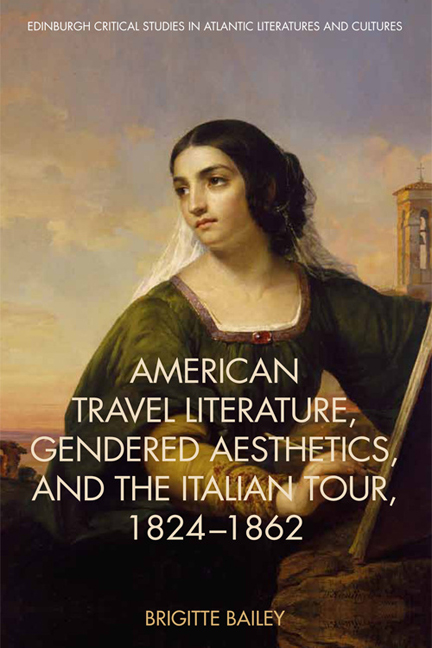Book contents
- Frontmatter
- Contents
- Illustrations
- Acknowledgments
- Introduction
- 1 Irving's Landscapes: Aesthetics, Visual Work, and the Tourist's Estate
- 2 The Protected Witness: Cooper, Cole, and the Male Tourist's Gaze
- 3 Gazing Women, Unstable Prospects: Sedgwick and Kirkland in the 1840s
- 4 Fuller and Revolutionary Rome: Republican and Urban Imaginaries
- 5 National Spaces, Catholic Icons, and Protestant Bodies: Instructing the Republican Subject in Hawthorne and Stowe
- Conclusion: Gender and Genre
- Notes
- Bibliography
- Index
3 - Gazing Women, Unstable Prospects: Sedgwick and Kirkland in the 1840s
Published online by Cambridge University Press: 10 May 2023
- Frontmatter
- Contents
- Illustrations
- Acknowledgments
- Introduction
- 1 Irving's Landscapes: Aesthetics, Visual Work, and the Tourist's Estate
- 2 The Protected Witness: Cooper, Cole, and the Male Tourist's Gaze
- 3 Gazing Women, Unstable Prospects: Sedgwick and Kirkland in the 1840s
- 4 Fuller and Revolutionary Rome: Republican and Urban Imaginaries
- 5 National Spaces, Catholic Icons, and Protestant Bodies: Instructing the Republican Subject in Hawthorne and Stowe
- Conclusion: Gender and Genre
- Notes
- Bibliography
- Index
Summary
But really this prospect-seeing is the most trying experience of the traveler. You ascend innumerable steps, … at the top you find a breeze that half blows you away, or a sun that quite bakes you, … Then your guide insists upon your seeing certain things which he declares all travelers do see, and he evidently suffers so much if he cannot make you see them too, that out of common humanity you put yourself to great inconvenience in staring, not at, but for, something which he assures you is a town, or perhaps an ocean, but which to you might as well be called a parcel of clothes drying in a meadow.
Caroline KirklandIn concluding the previous chapter, I argued that James Fenimore Cooper's later depiction of the Italian landscape in his novel The Wing-and-Wing (1842) worked to compose a normative subjectivity for the male citizen – the “American democrat” – by making generally available an elite gaze developed on the displaced grounds of Italy and through the mechanism of aesthetic response. Acquired abroad, this gaze would harmonize and preside over the heterogeneous social landscape of Jacksonian democracy at home, that is, it would create an imagined unity in a diverse, often unruly scene. By setting his novel in the 1790s, Cooper revisited the period in which the related nineteenth-century formations of liberalism and the picturesque emerged and re-naturalized these formations. By choosing Italy, so strongly coded as feminine in U.S. culture, as one of the sites on which this normative gaze was trained, he confirmed the association of “Woman, the aesthetic[,] and political hegemony” which, as Terry Eagleton noted, characterized this period. The aesthetic training made possible by the conjunction of the tourist gaze and the Italian site bound the self-ruling subject to the nation through his affective life and, in its further development, certified its owner as a “liberal” gentleman, the cultural guide of the middle class and the particular keeper of his nation's gaze.
If tourism and its expressions were part of the project of forming a national subjectivity through “culture,” a project steered by a northeastern elite, then they invited participation by women.
- Type
- Chapter
- Information
- Publisher: Edinburgh University PressPrint publication year: 2018



